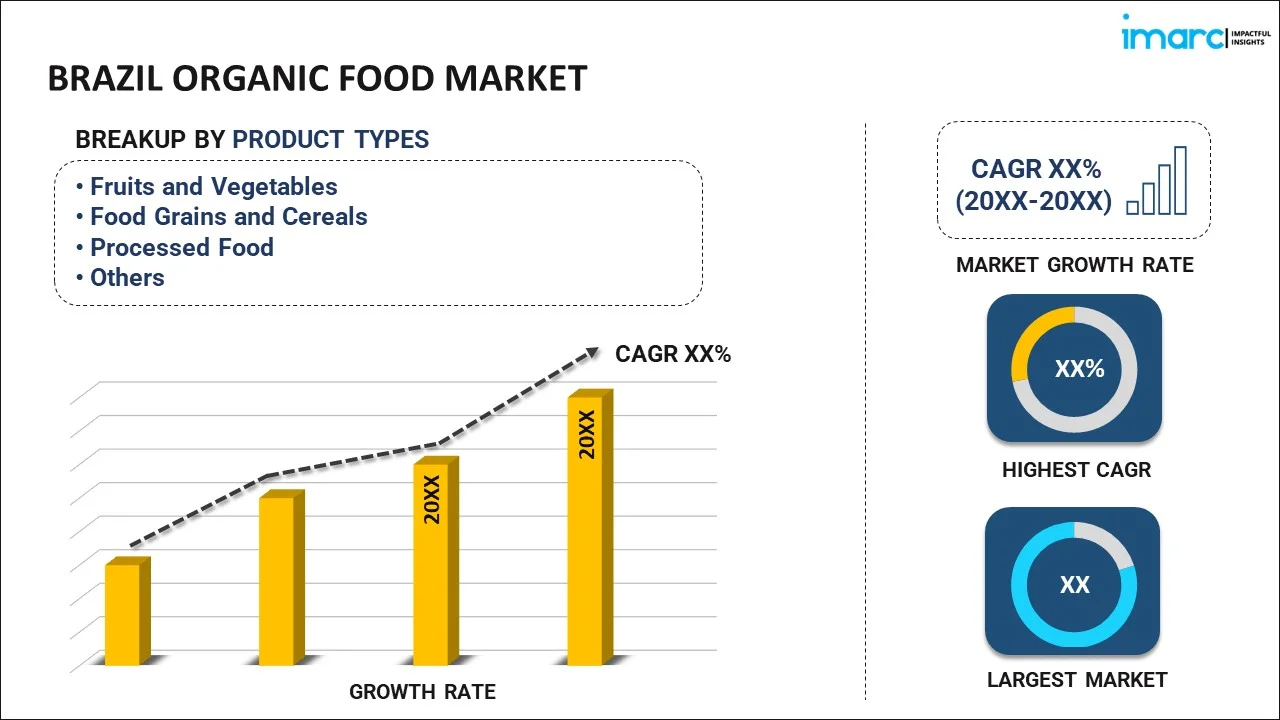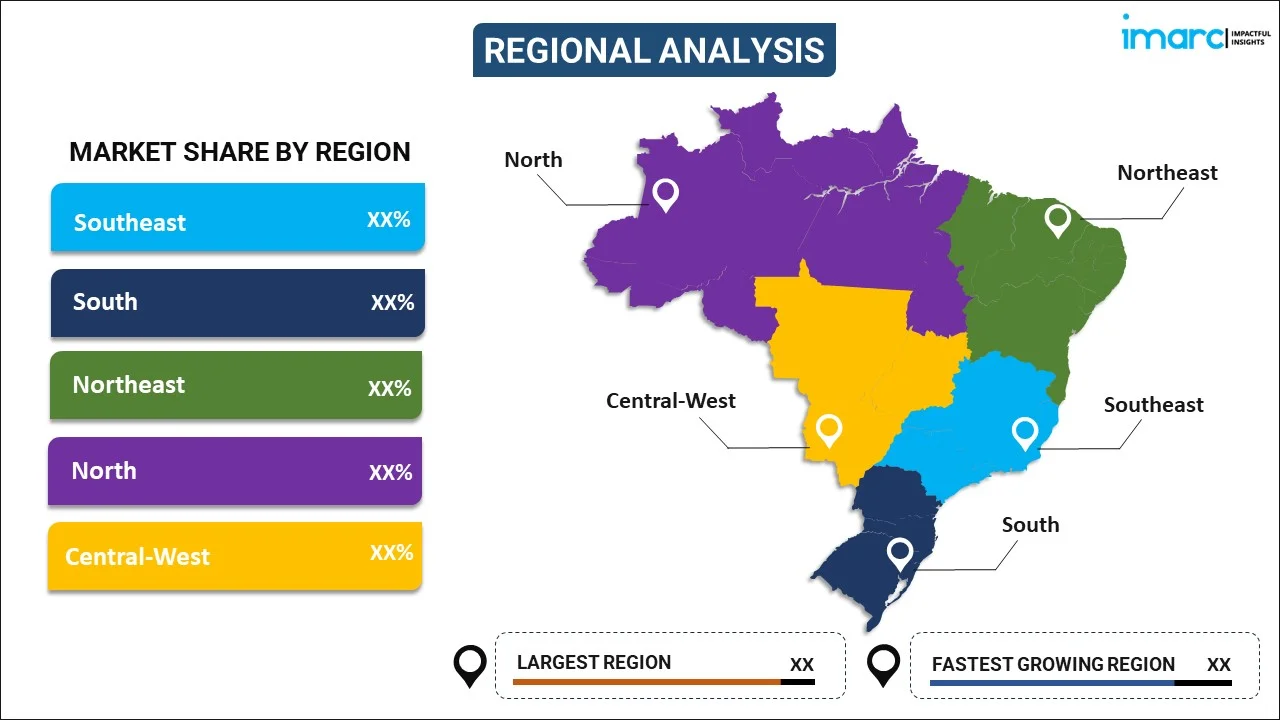
Brazil Organic Food Market Report by Product Type (Fruits and Vegetables, Food Grains and Cereals, Processed Food, Meat, Poultry and Dairy Products, Spices and Pulses, Beverages, and Others), Distribution Channel (Supermarkets and Hypermarkets, Specialty Stores, Direct/Institutional Sales, Online Stores, and Others), and Region 2025-2033
Market Overview:
The Brazil organic food market size reached USD 3.7 Billion in 2024. Looking forward, IMARC Group expects the market to reach USD 15.5 Billion by 2033, exhibiting a growth rate (CAGR) of 16.5% during 2025-2033.
|
Report Attribute
|
Key Statistics
|
|---|---|
|
Base Year
|
2024
|
|
Forecast Years
|
2025-2033
|
|
Historical Years
|
2019-2024
|
|
Market Size in 2024
|
USD 3.7 Billion |
|
Market Forecast in 2033
|
USD 15.5 Billion |
| Market Growth Rate (2025-2033) | 16.5% |
Organic foods are produced from organic farming methods that are free from pesticides, fertilizers, and genetically modified organisms (GMOs). They primarily include fruits, grains, vegetables, processed food, meat, dairy products, etc. In Brazil, the increasing consumer health consciousness along with rising demand for clean-label food products, is currently propelling the market for organic foods.
The growing consumer concerns towards the negative health impact of synthetic additives, GMOs, preservatives, etc., in conventionally processed food items are augmenting the demand for organic foods in Brazil. Furthermore, the high prevalence of numerous lifestyle diseases, such as diabetes, obesity, cardiovascular ailments, etc., is also bolstering the market growth in the country. Additionally, the elevating levels of urbanization and improving consumer living standards have increased the per capita expenditures on high-quality, organic food products in Brazil. Apart from this, the growing adoption of healthy dietary patterns due to the rising occurrence of lactose- and gluten-intolerance ailments is also driving the demand for gluten-free, lactose-free, and low-calorie product variants. Moreover, the increasing popularity of frozen, processed, and canned organic food items based on hectic work schedules and sedentary lifestyles of the consumers is further augmenting the market growth in Brazil. Besides this, the emergence of e-commerce platforms is also catalyzing the demand for organic foods supported with numerous product options, doorstep delivery, secured payment gateways, etc. Additionally, the Brazilian Ministry of Agricultural Development is introducing numerous policies for promoting the domestic production of organic foods, which will further continue to drive the market growth over the forecasted period.
Key Market Segmentation:
IMARC Group provides an analysis of the key trends in each segment of the Brazil organic food market report, along with forecasts at the country and regional levels from 2025-2033. Our report has categorized the market based on product type and distribution channel.
Breakup by Product Type:

- Fruits and Vegetables
- Food Grains and Cereals
- Processed Food
- Meat, Poultry and Dairy Products
- Spices and Pulses
- Beverages
- Others
Breakup by Distribution Channel:
- Supermarkets and Hypermarkets
- Specialty Stores
- Direct/Institutional Sales
- Online Stores
- Others
Breakup by Region:

- North
- Northeast
- Center-West
- Southeast
- South
Competitive Landscape:
The competitive landscape of the industry has also been examined with some of the key players being Apis Vida Industria e Comercio Produtos Farmaceuticos Ltda, Be Ingredient (Britvic PLC), Camil Alimentos SA (Camil Investimentos SA), JATOBÁ PRODUTOS AGROECOLÓGICAS, KORIN Agricultura Natural, Jasmine Alimentos Ltda. (Otsuka Pharmaceutical Co. Ltd), Mae Terra Produtos Naturais Ltda (SOLO ATS Participações do Brasil S.A) and Usina São Francisco SA (Balbo Economic Group).
Report Coverage:
| Report Features | Details |
|---|---|
| Base Year of the Analysis | 2024 |
| Historical Period | 2019-2024 |
| Forecast Period | 2025-2033 |
| Units | Billion USD |
| Segment Coverage | Product Type, Distribution Channel, Region |
| Region Covered | North, Northeast, Center-West, Southeast, South |
| Companies Covered | Apis Vida Industria e Comercio Produtos Farmaceuticos Ltda, Be Ingredient (Britvic PLC), Camil Alimentos SA (Camil Investimentos SA), JATOBÁ PRODUTOS AGROECOLÓGICAS, KORIN Agricultura Natural, Jasmine Alimentos Ltda. (Otsuka Pharmaceutical Co. Ltd), Mae Terra Produtos Naturais Ltda (SOLO ATS Participações do Brasil S.A) and Usina São Francisco SA (Balbo Economic Group) |
| Customization Scope | 10% Free Customization |
| Post-Sale Analyst Support | 10-12 Weeks |
| Delivery Format | PDF and Excel through Email (We can also provide the editable version of the report in PPT/Word format on special request) |
Key Questions Answered in This Report:
- How has the Brazil organic food market performed so far and how will it perform in the coming years?
- What has been the impact of COVID-19 on the Brazil organic food market?
- What are the key regional markets?
- What is the breakup of the market based on the product type?
- What is the breakup of the market based on the distribution channel?
- What are the various stages in the value chain of the industry?
- What are the key driving factors and challenges in the industry?
- What is the structure of the Brazil organic food market and who are the key players?
- What is the degree of competition in the industry?
Need more help?
- Speak to our experienced analysts for insights on the current market scenarios.
- Include additional segments and countries to customize the report as per your requirement.
- Gain an unparalleled competitive advantage in your domain by understanding how to utilize the report and positively impacting your operations and revenue.
- For further assistance, please connect with our analysts.
 Request Customization
Request Customization
 Speak to an Analyst
Speak to an Analyst
 Request Brochure
Request Brochure
 Inquire Before Buying
Inquire Before Buying




.webp)




.webp)












